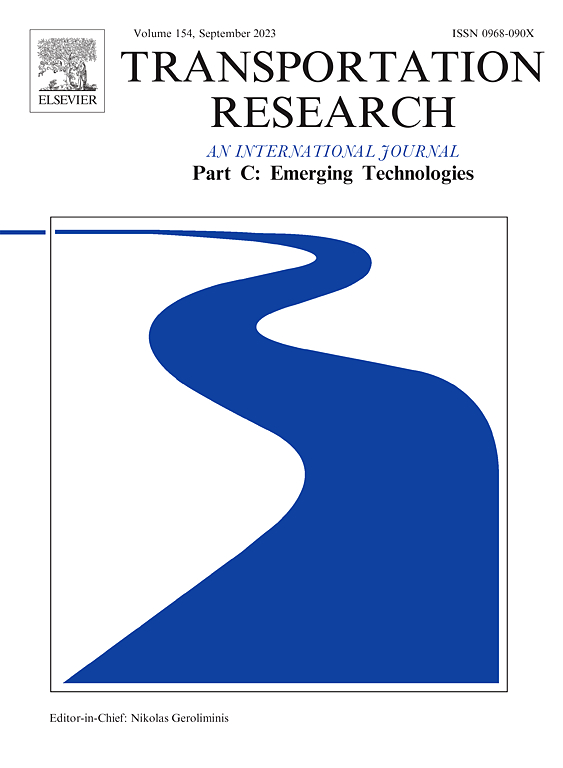Distributed adaptive traffic signal control based on shockwave theory
IF 7.6
1区 工程技术
Q1 TRANSPORTATION SCIENCE & TECHNOLOGY
Transportation Research Part C-Emerging Technologies
Pub Date : 2025-02-25
DOI:10.1016/j.trc.2025.105052
引用次数: 0
Abstract
Effective signal control with remarkable adaptability is important to constantly changing urban traffic systems. To accommodate diverse traffic conditions, this paper presents a uniform distributed adaptive traffic signal control method. A novel evaluation index termed synthetic delay is elucidated by leveraging shockwave theory. Considering the queue formation and flow changes of incoming traffic, it automatically evaluates control delay and throughput at intersections with distinct significance regarding various traffic conditions. Based on the synthetic delay, a distributed adaptive signal control method is proposed to optimize activated phase at each control stop, while also considering downstream queue length and availability of minor streets. The stability of the proposed method is proved mathematically and experimentally. A case study was conducted in a real-world network in Yangzhou, China during peak hours and off-peak hours. Results show that the method coordinates with adjacent intersections and improves the efficiency of the network under various conditions.
求助全文
约1分钟内获得全文
求助全文
来源期刊
CiteScore
15.80
自引率
12.00%
发文量
332
审稿时长
64 days
期刊介绍:
Transportation Research: Part C (TR_C) is dedicated to showcasing high-quality, scholarly research that delves into the development, applications, and implications of transportation systems and emerging technologies. Our focus lies not solely on individual technologies, but rather on their broader implications for the planning, design, operation, control, maintenance, and rehabilitation of transportation systems, services, and components. In essence, the intellectual core of the journal revolves around the transportation aspect rather than the technology itself. We actively encourage the integration of quantitative methods from diverse fields such as operations research, control systems, complex networks, computer science, and artificial intelligence. Join us in exploring the intersection of transportation systems and emerging technologies to drive innovation and progress in the field.

 求助内容:
求助内容: 应助结果提醒方式:
应助结果提醒方式:


